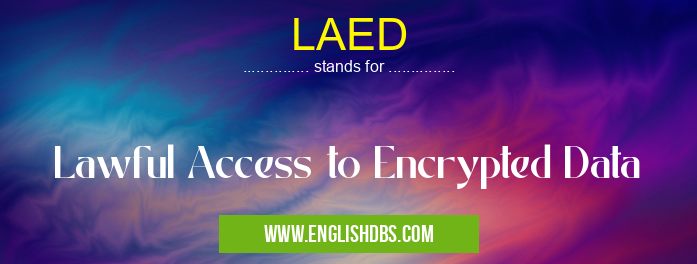What does LAED mean in UNCLASSIFIED
LAED (Lawful Access to Encrypted Data) refers to the legal frameworks and technical mechanisms that allow law enforcement and government agencies to access encrypted data without compromising its security.

LAED meaning in Unclassified in Miscellaneous
LAED mostly used in an acronym Unclassified in Category Miscellaneous that means Lawful Access to Encrypted Data
Shorthand: LAED,
Full Form: Lawful Access to Encrypted Data
For more information of "Lawful Access to Encrypted Data", see the section below.
What is LAED?
LAED involves balancing the need for law enforcement to access data for legitimate investigations with the right to privacy and data protection of individuals. It aims to establish a framework that enables authorities to obtain encrypted data while maintaining its confidentiality and integrity.
LAED Mechanisms
Various LAED mechanisms exist, including:
- Key Escrow: Storing encryption keys with a trusted third party accessible to law enforcement with proper authorization.
- Backdoors: Intentionally introducing vulnerabilities into encryption systems to grant authorized access.
- Encryption Negotiation: Negotiating with communication service providers to provide access to encrypted data in specific circumstances.
Benefits of LAED
LAED offers several benefits:
- Enhanced Law Enforcement: Provides authorities with access to encrypted data for criminal investigations, terrorism prevention, and other legitimate purposes.
- Preservation of Privacy: Ensures that encrypted data remains protected from unauthorized access, even by law enforcement.
- Technological Advancement: Drives innovation in encryption technologies and helps develop secure protocols.
Challenges of LAED
Implementing LAED poses certain challenges:
- Complexity: Balancing privacy and security concerns requires careful consideration and collaboration between policymakers, technologists, and legal experts.
- Potential for Abuse: Unauthorized access to encrypted data could lead to privacy violations or weaponization by malicious actors.
- Weakening Encryption Standards: The introduction of LAED mechanisms may compromise the overall strength of encryption protocols.
Essential Questions and Answers on Lawful Access to Encrypted Data in "MISCELLANEOUS»UNFILED"
What is Lawful Access to Encrypted Data (LAED)?
LAED refers to the ability of law enforcement agencies to access and decrypt encrypted data or communications in accordance with legal authority. This includes data encrypted by individuals, businesses, or other organizations.
Why is LAED necessary?
LAED is considered necessary to ensure that law enforcement can investigate and prosecute crimes effectively. Encrypted data can conceal evidence of criminal activity, such as communications between suspects, financial records, or personal information.
How is LAED implemented?
LAED can be implemented through various methods, such as:
- Key Escrow: Encrypting data with a key that is held in escrow by a trusted third party, such as a government agency or technology company.
- Encryption Backdoors: Including intentional vulnerabilities in encryption algorithms or software that allow authorized parties to access the data.
- Compelled Access: Requiring individuals or organizations to provide the decryption keys or plain text data to law enforcement with a valid warrant.
What are the concerns about LAED?
LAED raises concerns about:
- Privacy: It could compromise the privacy of individuals who use encryption to protect sensitive information.
- Security: LAED methods could potentially create vulnerabilities that could be exploited by criminals.
- Civil Liberties: It could undermine the right to privacy and due process, as it allows law enforcement to access data without the consent of the owner.
How can concerns about LAED be addressed?
Concerns about LAED can be addressed through:
- Strong Legal Safeguards: Ensuring that LAED is subject to strict legal authorization and oversight.
- Transparency and Accountability: Requiring law enforcement agencies to disclose when and how they access encrypted data.
- Research and Innovation: Continued research and development of encryption technologies that balance security with the need for lawful access.
Final Words: LAED serves as a crucial framework in the ongoing debate between privacy and security. By establishing mechanisms for lawful access to encrypted data, it aims to protect both individual rights and the ability of law enforcement to fulfill their duties. However, balancing these interests requires ongoing evaluation and collaboration to ensure the development of secure and privacy-preserving solutions.
